Critical Discussion: HRM Topics - Reflective Portfolio Report
VerifiedAdded on 2023/01/16
|10
|2960
|100
Report
AI Summary
This report presents a reflective portfolio analyzing key concepts from a Human Resource Management (HRM) module. It explores various HRM theories, including motivation theories like Maslow's Hierarchy and Herzberg's theory, and their implications for organizational effectiveness. The report emphasizes the importance of leadership, power dynamics, conflict resolution, and organizational learning. It discusses how these concepts can be applied in a practical setting, particularly in providing training, fostering employee satisfaction, and adapting to changes in the business environment. The author plans to utilize the knowledge gained to enhance leadership skills, promote effective communication, and contribute to a positive work environment. The report also outlines the actions planned based on the learning from the HRM module, emphasizing the use of communication skills and digital technology for better information dissemination.
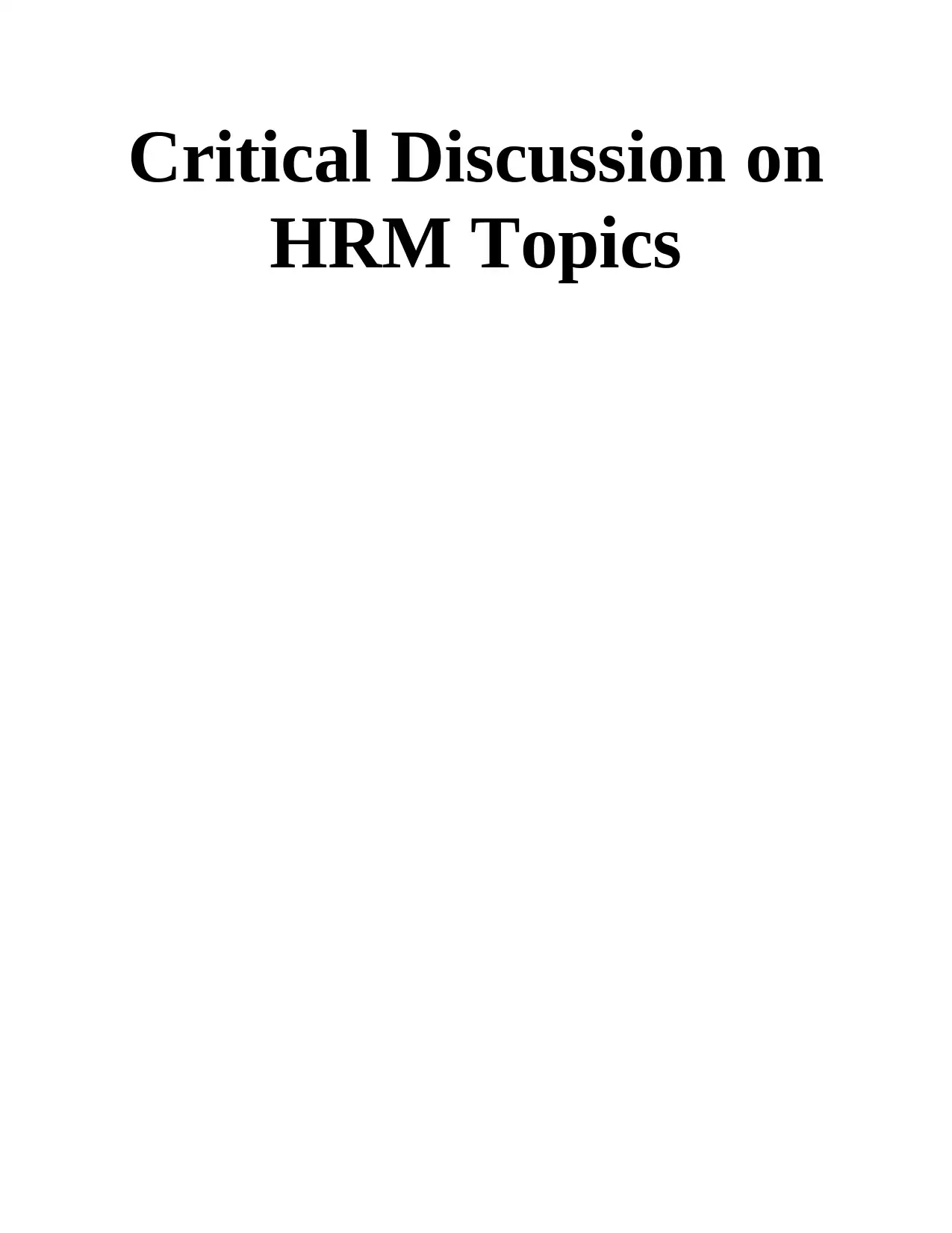
Critical Discussion on
HRM Topics
HRM Topics
Paraphrase This Document
Need a fresh take? Get an instant paraphrase of this document with our AI Paraphraser
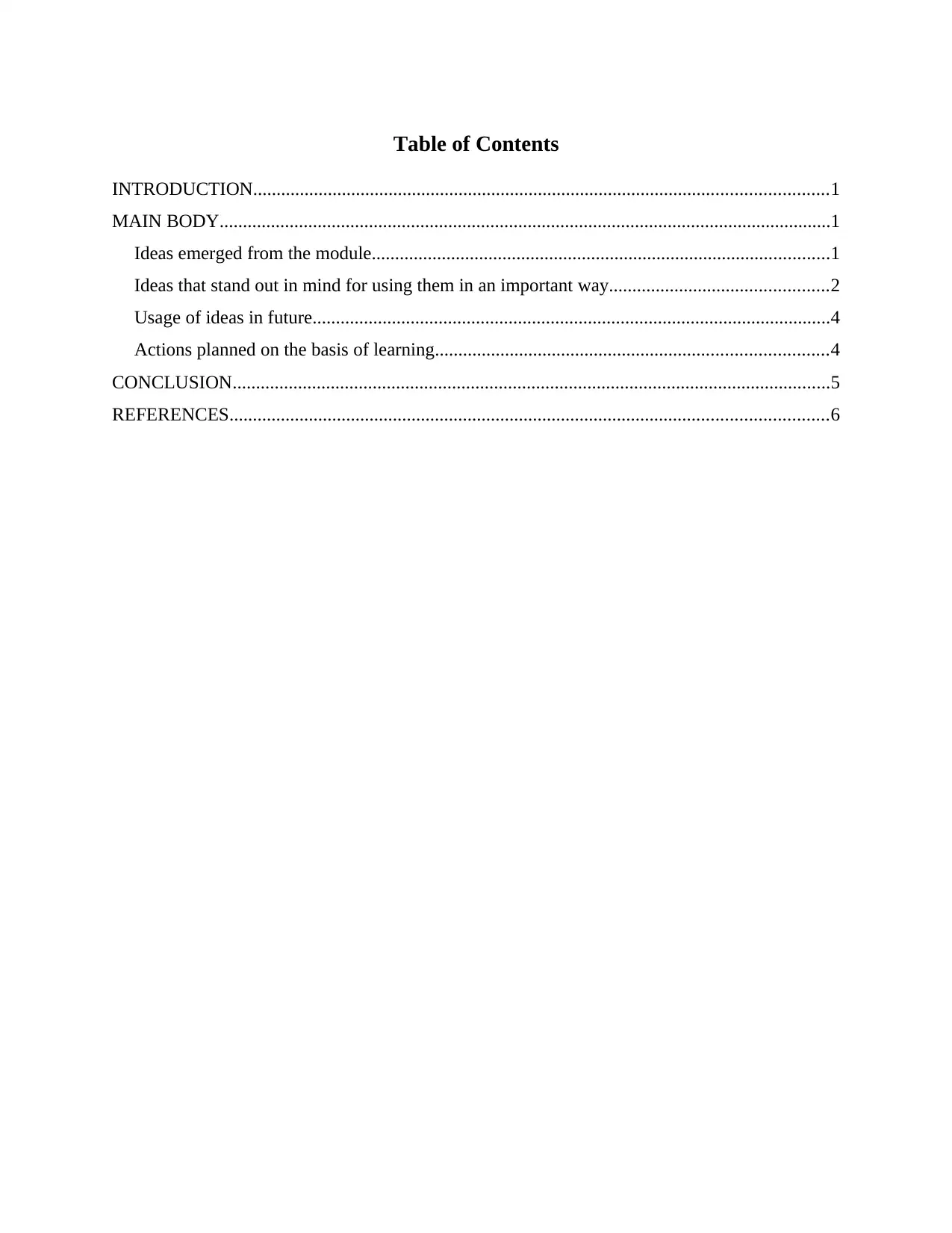
Table of Contents
INTRODUCTION...........................................................................................................................1
MAIN BODY...................................................................................................................................1
Ideas emerged from the module..................................................................................................1
Ideas that stand out in mind for using them in an important way...............................................2
Usage of ideas in future...............................................................................................................4
Actions planned on the basis of learning....................................................................................4
CONCLUSION................................................................................................................................5
REFERENCES................................................................................................................................6
INTRODUCTION...........................................................................................................................1
MAIN BODY...................................................................................................................................1
Ideas emerged from the module..................................................................................................1
Ideas that stand out in mind for using them in an important way...............................................2
Usage of ideas in future...............................................................................................................4
Actions planned on the basis of learning....................................................................................4
CONCLUSION................................................................................................................................5
REFERENCES................................................................................................................................6

⊘ This is a preview!⊘
Do you want full access?
Subscribe today to unlock all pages.

Trusted by 1+ million students worldwide
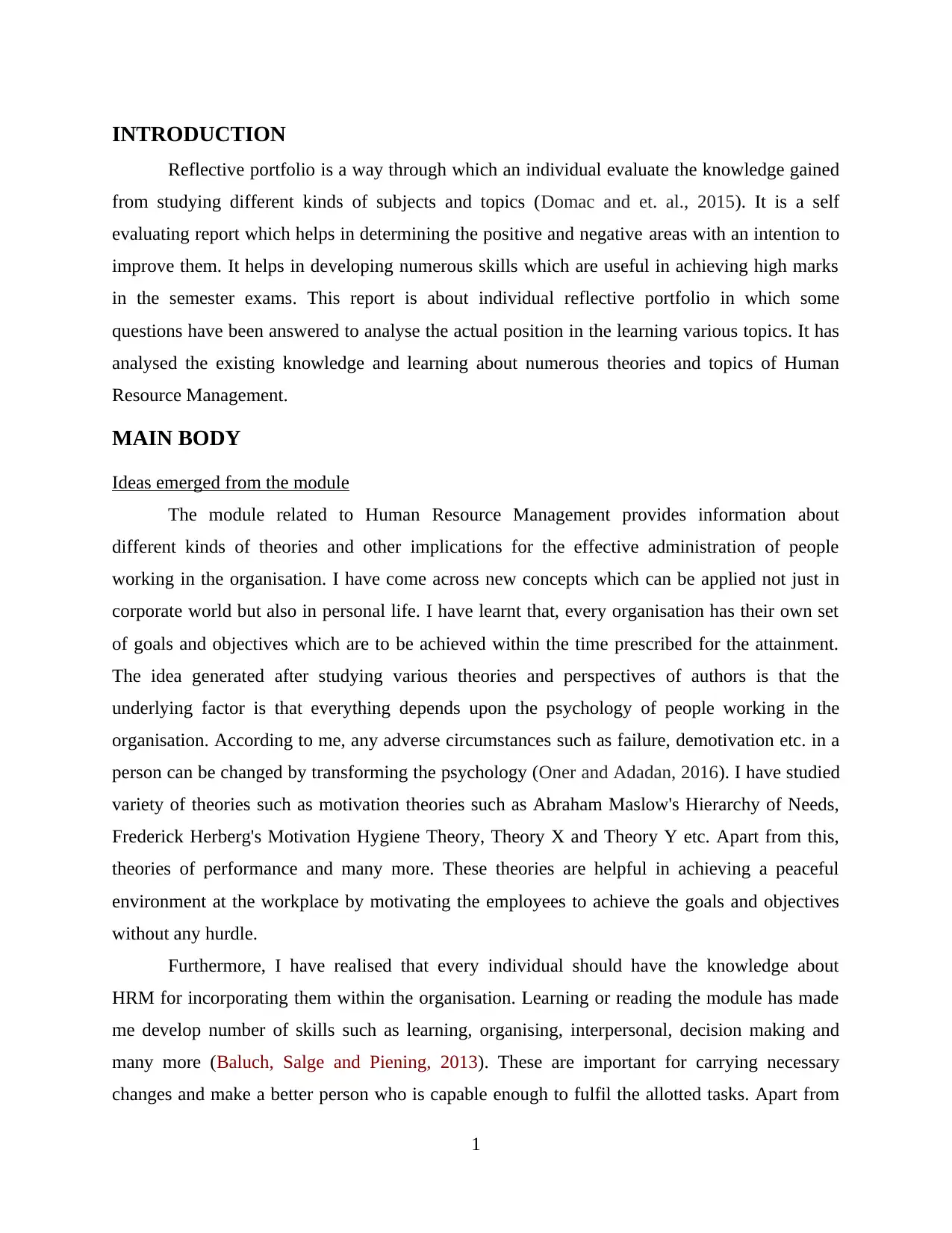
INTRODUCTION
Reflective portfolio is a way through which an individual evaluate the knowledge gained
from studying different kinds of subjects and topics (Domac and et. al., 2015). It is a self
evaluating report which helps in determining the positive and negative areas with an intention to
improve them. It helps in developing numerous skills which are useful in achieving high marks
in the semester exams. This report is about individual reflective portfolio in which some
questions have been answered to analyse the actual position in the learning various topics. It has
analysed the existing knowledge and learning about numerous theories and topics of Human
Resource Management.
MAIN BODY
Ideas emerged from the module
The module related to Human Resource Management provides information about
different kinds of theories and other implications for the effective administration of people
working in the organisation. I have come across new concepts which can be applied not just in
corporate world but also in personal life. I have learnt that, every organisation has their own set
of goals and objectives which are to be achieved within the time prescribed for the attainment.
The idea generated after studying various theories and perspectives of authors is that the
underlying factor is that everything depends upon the psychology of people working in the
organisation. According to me, any adverse circumstances such as failure, demotivation etc. in a
person can be changed by transforming the psychology (Oner and Adadan, 2016). I have studied
variety of theories such as motivation theories such as Abraham Maslow's Hierarchy of Needs,
Frederick Herberg's Motivation Hygiene Theory, Theory X and Theory Y etc. Apart from this,
theories of performance and many more. These theories are helpful in achieving a peaceful
environment at the workplace by motivating the employees to achieve the goals and objectives
without any hurdle.
Furthermore, I have realised that every individual should have the knowledge about
HRM for incorporating them within the organisation. Learning or reading the module has made
me develop number of skills such as learning, organising, interpersonal, decision making and
many more (Baluch, Salge and Piening, 2013). These are important for carrying necessary
changes and make a better person who is capable enough to fulfil the allotted tasks. Apart from
1
Reflective portfolio is a way through which an individual evaluate the knowledge gained
from studying different kinds of subjects and topics (Domac and et. al., 2015). It is a self
evaluating report which helps in determining the positive and negative areas with an intention to
improve them. It helps in developing numerous skills which are useful in achieving high marks
in the semester exams. This report is about individual reflective portfolio in which some
questions have been answered to analyse the actual position in the learning various topics. It has
analysed the existing knowledge and learning about numerous theories and topics of Human
Resource Management.
MAIN BODY
Ideas emerged from the module
The module related to Human Resource Management provides information about
different kinds of theories and other implications for the effective administration of people
working in the organisation. I have come across new concepts which can be applied not just in
corporate world but also in personal life. I have learnt that, every organisation has their own set
of goals and objectives which are to be achieved within the time prescribed for the attainment.
The idea generated after studying various theories and perspectives of authors is that the
underlying factor is that everything depends upon the psychology of people working in the
organisation. According to me, any adverse circumstances such as failure, demotivation etc. in a
person can be changed by transforming the psychology (Oner and Adadan, 2016). I have studied
variety of theories such as motivation theories such as Abraham Maslow's Hierarchy of Needs,
Frederick Herberg's Motivation Hygiene Theory, Theory X and Theory Y etc. Apart from this,
theories of performance and many more. These theories are helpful in achieving a peaceful
environment at the workplace by motivating the employees to achieve the goals and objectives
without any hurdle.
Furthermore, I have realised that every individual should have the knowledge about
HRM for incorporating them within the organisation. Learning or reading the module has made
me develop number of skills such as learning, organising, interpersonal, decision making and
many more (Baluch, Salge and Piening, 2013). These are important for carrying necessary
changes and make a better person who is capable enough to fulfil the allotted tasks. Apart from
1
Paraphrase This Document
Need a fresh take? Get an instant paraphrase of this document with our AI Paraphraser
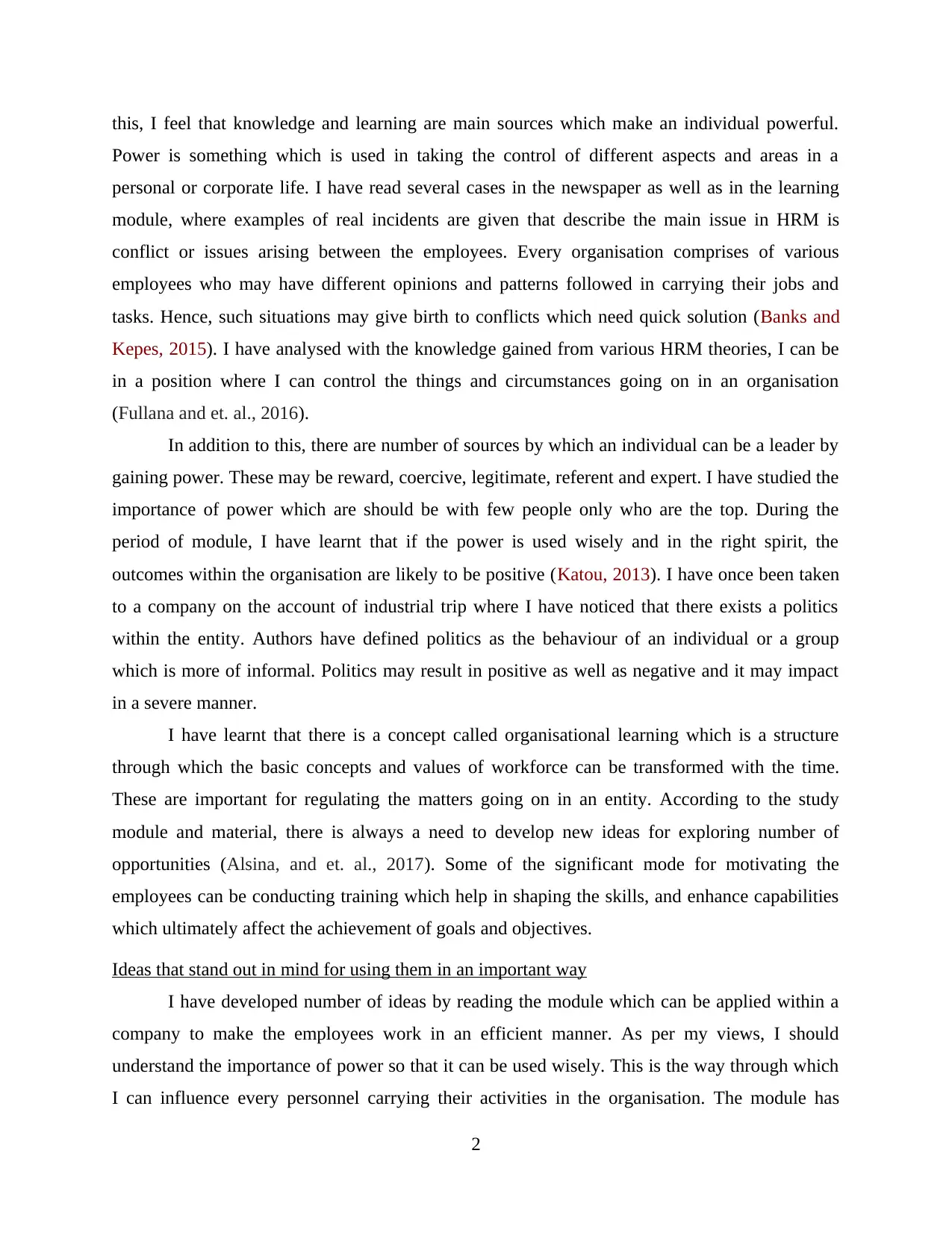
this, I feel that knowledge and learning are main sources which make an individual powerful.
Power is something which is used in taking the control of different aspects and areas in a
personal or corporate life. I have read several cases in the newspaper as well as in the learning
module, where examples of real incidents are given that describe the main issue in HRM is
conflict or issues arising between the employees. Every organisation comprises of various
employees who may have different opinions and patterns followed in carrying their jobs and
tasks. Hence, such situations may give birth to conflicts which need quick solution (Banks and
Kepes, 2015). I have analysed with the knowledge gained from various HRM theories, I can be
in a position where I can control the things and circumstances going on in an organisation
(Fullana and et. al., 2016).
In addition to this, there are number of sources by which an individual can be a leader by
gaining power. These may be reward, coercive, legitimate, referent and expert. I have studied the
importance of power which are should be with few people only who are the top. During the
period of module, I have learnt that if the power is used wisely and in the right spirit, the
outcomes within the organisation are likely to be positive (Katou, 2013). I have once been taken
to a company on the account of industrial trip where I have noticed that there exists a politics
within the entity. Authors have defined politics as the behaviour of an individual or a group
which is more of informal. Politics may result in positive as well as negative and it may impact
in a severe manner.
I have learnt that there is a concept called organisational learning which is a structure
through which the basic concepts and values of workforce can be transformed with the time.
These are important for regulating the matters going on in an entity. According to the study
module and material, there is always a need to develop new ideas for exploring number of
opportunities (Alsina, and et. al., 2017). Some of the significant mode for motivating the
employees can be conducting training which help in shaping the skills, and enhance capabilities
which ultimately affect the achievement of goals and objectives.
Ideas that stand out in mind for using them in an important way
I have developed number of ideas by reading the module which can be applied within a
company to make the employees work in an efficient manner. As per my views, I should
understand the importance of power so that it can be used wisely. This is the way through which
I can influence every personnel carrying their activities in the organisation. The module has
2
Power is something which is used in taking the control of different aspects and areas in a
personal or corporate life. I have read several cases in the newspaper as well as in the learning
module, where examples of real incidents are given that describe the main issue in HRM is
conflict or issues arising between the employees. Every organisation comprises of various
employees who may have different opinions and patterns followed in carrying their jobs and
tasks. Hence, such situations may give birth to conflicts which need quick solution (Banks and
Kepes, 2015). I have analysed with the knowledge gained from various HRM theories, I can be
in a position where I can control the things and circumstances going on in an organisation
(Fullana and et. al., 2016).
In addition to this, there are number of sources by which an individual can be a leader by
gaining power. These may be reward, coercive, legitimate, referent and expert. I have studied the
importance of power which are should be with few people only who are the top. During the
period of module, I have learnt that if the power is used wisely and in the right spirit, the
outcomes within the organisation are likely to be positive (Katou, 2013). I have once been taken
to a company on the account of industrial trip where I have noticed that there exists a politics
within the entity. Authors have defined politics as the behaviour of an individual or a group
which is more of informal. Politics may result in positive as well as negative and it may impact
in a severe manner.
I have learnt that there is a concept called organisational learning which is a structure
through which the basic concepts and values of workforce can be transformed with the time.
These are important for regulating the matters going on in an entity. According to the study
module and material, there is always a need to develop new ideas for exploring number of
opportunities (Alsina, and et. al., 2017). Some of the significant mode for motivating the
employees can be conducting training which help in shaping the skills, and enhance capabilities
which ultimately affect the achievement of goals and objectives.
Ideas that stand out in mind for using them in an important way
I have developed number of ideas by reading the module which can be applied within a
company to make the employees work in an efficient manner. As per my views, I should
understand the importance of power so that it can be used wisely. This is the way through which
I can influence every personnel carrying their activities in the organisation. The module has
2
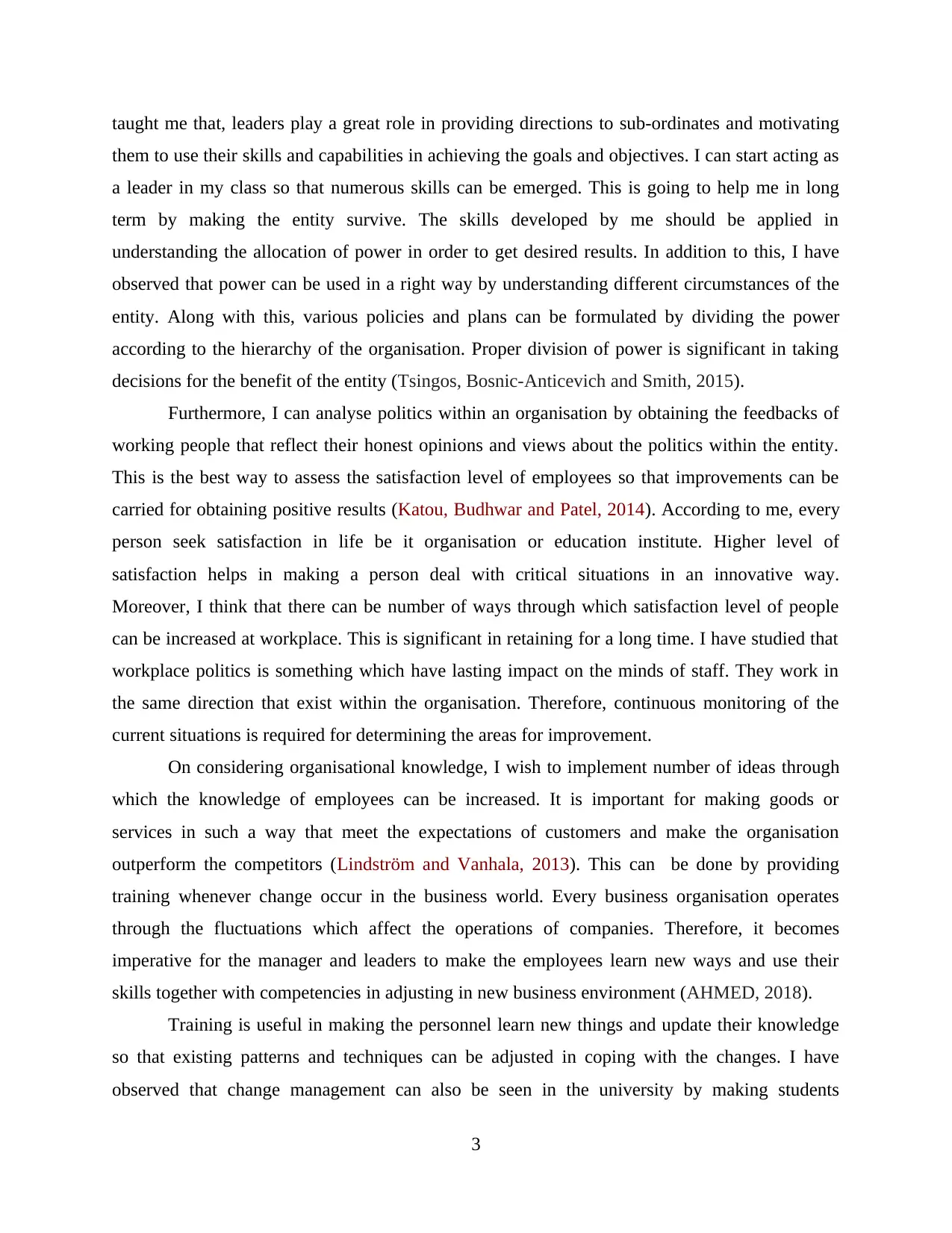
taught me that, leaders play a great role in providing directions to sub-ordinates and motivating
them to use their skills and capabilities in achieving the goals and objectives. I can start acting as
a leader in my class so that numerous skills can be emerged. This is going to help me in long
term by making the entity survive. The skills developed by me should be applied in
understanding the allocation of power in order to get desired results. In addition to this, I have
observed that power can be used in a right way by understanding different circumstances of the
entity. Along with this, various policies and plans can be formulated by dividing the power
according to the hierarchy of the organisation. Proper division of power is significant in taking
decisions for the benefit of the entity (Tsingos, Bosnic-Anticevich and Smith, 2015).
Furthermore, I can analyse politics within an organisation by obtaining the feedbacks of
working people that reflect their honest opinions and views about the politics within the entity.
This is the best way to assess the satisfaction level of employees so that improvements can be
carried for obtaining positive results (Katou, Budhwar and Patel, 2014). According to me, every
person seek satisfaction in life be it organisation or education institute. Higher level of
satisfaction helps in making a person deal with critical situations in an innovative way.
Moreover, I think that there can be number of ways through which satisfaction level of people
can be increased at workplace. This is significant in retaining for a long time. I have studied that
workplace politics is something which have lasting impact on the minds of staff. They work in
the same direction that exist within the organisation. Therefore, continuous monitoring of the
current situations is required for determining the areas for improvement.
On considering organisational knowledge, I wish to implement number of ideas through
which the knowledge of employees can be increased. It is important for making goods or
services in such a way that meet the expectations of customers and make the organisation
outperform the competitors (Lindström and Vanhala, 2013). This can be done by providing
training whenever change occur in the business world. Every business organisation operates
through the fluctuations which affect the operations of companies. Therefore, it becomes
imperative for the manager and leaders to make the employees learn new ways and use their
skills together with competencies in adjusting in new business environment (AHMED, 2018).
Training is useful in making the personnel learn new things and update their knowledge
so that existing patterns and techniques can be adjusted in coping with the changes. I have
observed that change management can also be seen in the university by making students
3
them to use their skills and capabilities in achieving the goals and objectives. I can start acting as
a leader in my class so that numerous skills can be emerged. This is going to help me in long
term by making the entity survive. The skills developed by me should be applied in
understanding the allocation of power in order to get desired results. In addition to this, I have
observed that power can be used in a right way by understanding different circumstances of the
entity. Along with this, various policies and plans can be formulated by dividing the power
according to the hierarchy of the organisation. Proper division of power is significant in taking
decisions for the benefit of the entity (Tsingos, Bosnic-Anticevich and Smith, 2015).
Furthermore, I can analyse politics within an organisation by obtaining the feedbacks of
working people that reflect their honest opinions and views about the politics within the entity.
This is the best way to assess the satisfaction level of employees so that improvements can be
carried for obtaining positive results (Katou, Budhwar and Patel, 2014). According to me, every
person seek satisfaction in life be it organisation or education institute. Higher level of
satisfaction helps in making a person deal with critical situations in an innovative way.
Moreover, I think that there can be number of ways through which satisfaction level of people
can be increased at workplace. This is significant in retaining for a long time. I have studied that
workplace politics is something which have lasting impact on the minds of staff. They work in
the same direction that exist within the organisation. Therefore, continuous monitoring of the
current situations is required for determining the areas for improvement.
On considering organisational knowledge, I wish to implement number of ideas through
which the knowledge of employees can be increased. It is important for making goods or
services in such a way that meet the expectations of customers and make the organisation
outperform the competitors (Lindström and Vanhala, 2013). This can be done by providing
training whenever change occur in the business world. Every business organisation operates
through the fluctuations which affect the operations of companies. Therefore, it becomes
imperative for the manager and leaders to make the employees learn new ways and use their
skills together with competencies in adjusting in new business environment (AHMED, 2018).
Training is useful in making the personnel learn new things and update their knowledge
so that existing patterns and techniques can be adjusted in coping with the changes. I have
observed that change management can also be seen in the university by making students
3
⊘ This is a preview!⊘
Do you want full access?
Subscribe today to unlock all pages.

Trusted by 1+ million students worldwide
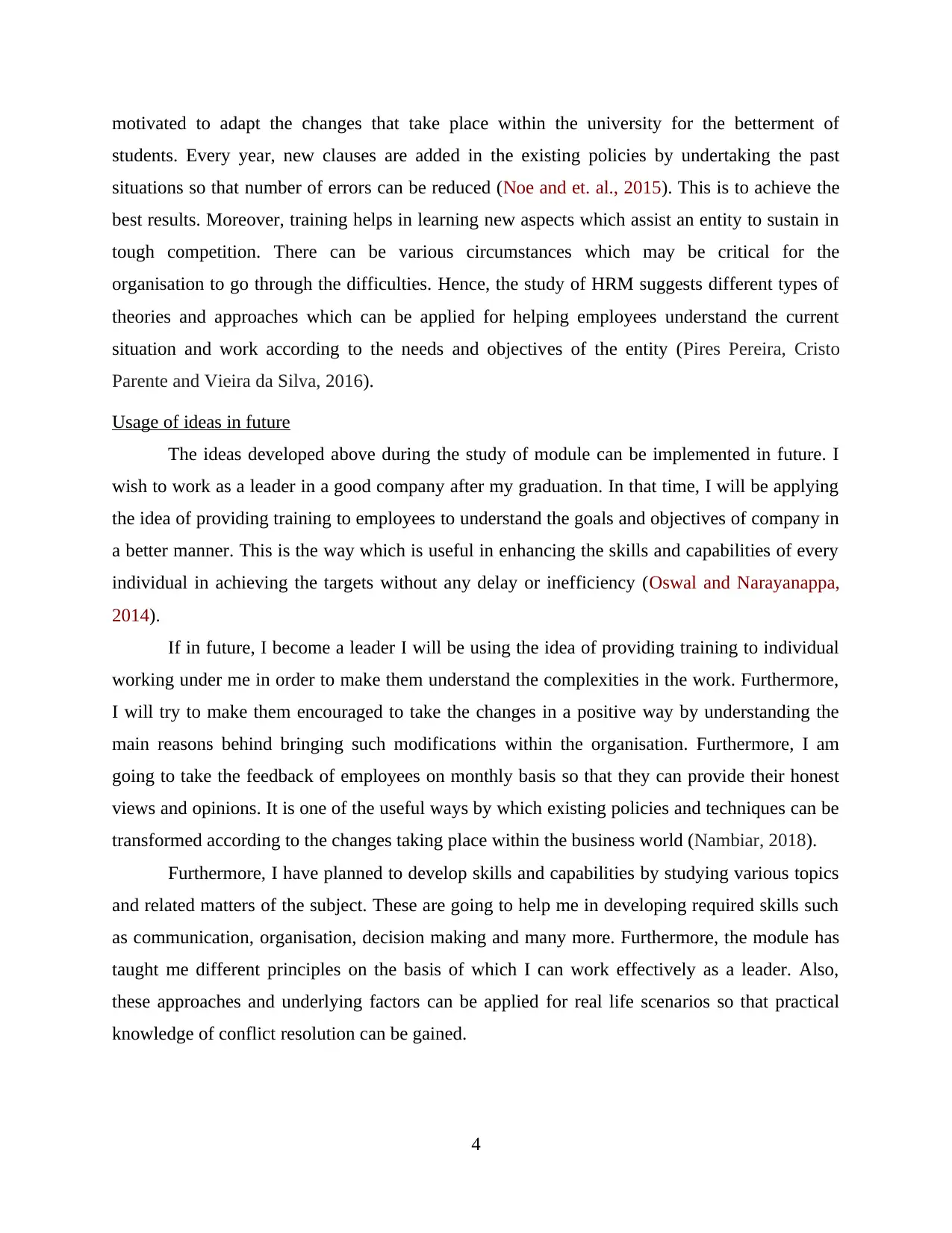
motivated to adapt the changes that take place within the university for the betterment of
students. Every year, new clauses are added in the existing policies by undertaking the past
situations so that number of errors can be reduced (Noe and et. al., 2015). This is to achieve the
best results. Moreover, training helps in learning new aspects which assist an entity to sustain in
tough competition. There can be various circumstances which may be critical for the
organisation to go through the difficulties. Hence, the study of HRM suggests different types of
theories and approaches which can be applied for helping employees understand the current
situation and work according to the needs and objectives of the entity (Pires Pereira, Cristo
Parente and Vieira da Silva, 2016).
Usage of ideas in future
The ideas developed above during the study of module can be implemented in future. I
wish to work as a leader in a good company after my graduation. In that time, I will be applying
the idea of providing training to employees to understand the goals and objectives of company in
a better manner. This is the way which is useful in enhancing the skills and capabilities of every
individual in achieving the targets without any delay or inefficiency (Oswal and Narayanappa,
2014).
If in future, I become a leader I will be using the idea of providing training to individual
working under me in order to make them understand the complexities in the work. Furthermore,
I will try to make them encouraged to take the changes in a positive way by understanding the
main reasons behind bringing such modifications within the organisation. Furthermore, I am
going to take the feedback of employees on monthly basis so that they can provide their honest
views and opinions. It is one of the useful ways by which existing policies and techniques can be
transformed according to the changes taking place within the business world (Nambiar, 2018).
Furthermore, I have planned to develop skills and capabilities by studying various topics
and related matters of the subject. These are going to help me in developing required skills such
as communication, organisation, decision making and many more. Furthermore, the module has
taught me different principles on the basis of which I can work effectively as a leader. Also,
these approaches and underlying factors can be applied for real life scenarios so that practical
knowledge of conflict resolution can be gained.
4
students. Every year, new clauses are added in the existing policies by undertaking the past
situations so that number of errors can be reduced (Noe and et. al., 2015). This is to achieve the
best results. Moreover, training helps in learning new aspects which assist an entity to sustain in
tough competition. There can be various circumstances which may be critical for the
organisation to go through the difficulties. Hence, the study of HRM suggests different types of
theories and approaches which can be applied for helping employees understand the current
situation and work according to the needs and objectives of the entity (Pires Pereira, Cristo
Parente and Vieira da Silva, 2016).
Usage of ideas in future
The ideas developed above during the study of module can be implemented in future. I
wish to work as a leader in a good company after my graduation. In that time, I will be applying
the idea of providing training to employees to understand the goals and objectives of company in
a better manner. This is the way which is useful in enhancing the skills and capabilities of every
individual in achieving the targets without any delay or inefficiency (Oswal and Narayanappa,
2014).
If in future, I become a leader I will be using the idea of providing training to individual
working under me in order to make them understand the complexities in the work. Furthermore,
I will try to make them encouraged to take the changes in a positive way by understanding the
main reasons behind bringing such modifications within the organisation. Furthermore, I am
going to take the feedback of employees on monthly basis so that they can provide their honest
views and opinions. It is one of the useful ways by which existing policies and techniques can be
transformed according to the changes taking place within the business world (Nambiar, 2018).
Furthermore, I have planned to develop skills and capabilities by studying various topics
and related matters of the subject. These are going to help me in developing required skills such
as communication, organisation, decision making and many more. Furthermore, the module has
taught me different principles on the basis of which I can work effectively as a leader. Also,
these approaches and underlying factors can be applied for real life scenarios so that practical
knowledge of conflict resolution can be gained.
4
Paraphrase This Document
Need a fresh take? Get an instant paraphrase of this document with our AI Paraphraser
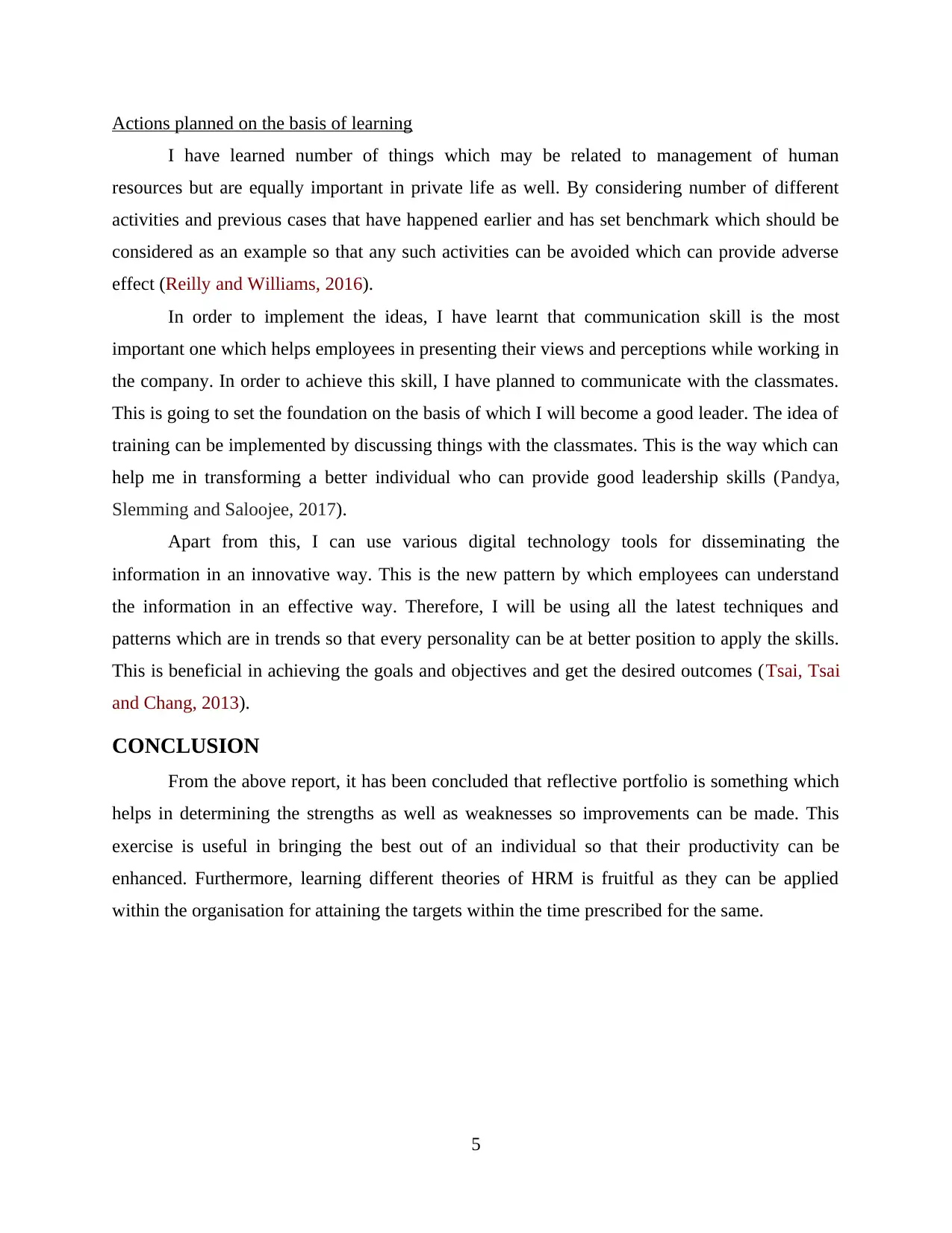
Actions planned on the basis of learning
I have learned number of things which may be related to management of human
resources but are equally important in private life as well. By considering number of different
activities and previous cases that have happened earlier and has set benchmark which should be
considered as an example so that any such activities can be avoided which can provide adverse
effect (Reilly and Williams, 2016).
In order to implement the ideas, I have learnt that communication skill is the most
important one which helps employees in presenting their views and perceptions while working in
the company. In order to achieve this skill, I have planned to communicate with the classmates.
This is going to set the foundation on the basis of which I will become a good leader. The idea of
training can be implemented by discussing things with the classmates. This is the way which can
help me in transforming a better individual who can provide good leadership skills (Pandya,
Slemming and Saloojee, 2017).
Apart from this, I can use various digital technology tools for disseminating the
information in an innovative way. This is the new pattern by which employees can understand
the information in an effective way. Therefore, I will be using all the latest techniques and
patterns which are in trends so that every personality can be at better position to apply the skills.
This is beneficial in achieving the goals and objectives and get the desired outcomes (Tsai, Tsai
and Chang, 2013).
CONCLUSION
From the above report, it has been concluded that reflective portfolio is something which
helps in determining the strengths as well as weaknesses so improvements can be made. This
exercise is useful in bringing the best out of an individual so that their productivity can be
enhanced. Furthermore, learning different theories of HRM is fruitful as they can be applied
within the organisation for attaining the targets within the time prescribed for the same.
5
I have learned number of things which may be related to management of human
resources but are equally important in private life as well. By considering number of different
activities and previous cases that have happened earlier and has set benchmark which should be
considered as an example so that any such activities can be avoided which can provide adverse
effect (Reilly and Williams, 2016).
In order to implement the ideas, I have learnt that communication skill is the most
important one which helps employees in presenting their views and perceptions while working in
the company. In order to achieve this skill, I have planned to communicate with the classmates.
This is going to set the foundation on the basis of which I will become a good leader. The idea of
training can be implemented by discussing things with the classmates. This is the way which can
help me in transforming a better individual who can provide good leadership skills (Pandya,
Slemming and Saloojee, 2017).
Apart from this, I can use various digital technology tools for disseminating the
information in an innovative way. This is the new pattern by which employees can understand
the information in an effective way. Therefore, I will be using all the latest techniques and
patterns which are in trends so that every personality can be at better position to apply the skills.
This is beneficial in achieving the goals and objectives and get the desired outcomes (Tsai, Tsai
and Chang, 2013).
CONCLUSION
From the above report, it has been concluded that reflective portfolio is something which
helps in determining the strengths as well as weaknesses so improvements can be made. This
exercise is useful in bringing the best out of an individual so that their productivity can be
enhanced. Furthermore, learning different theories of HRM is fruitful as they can be applied
within the organisation for attaining the targets within the time prescribed for the same.
5
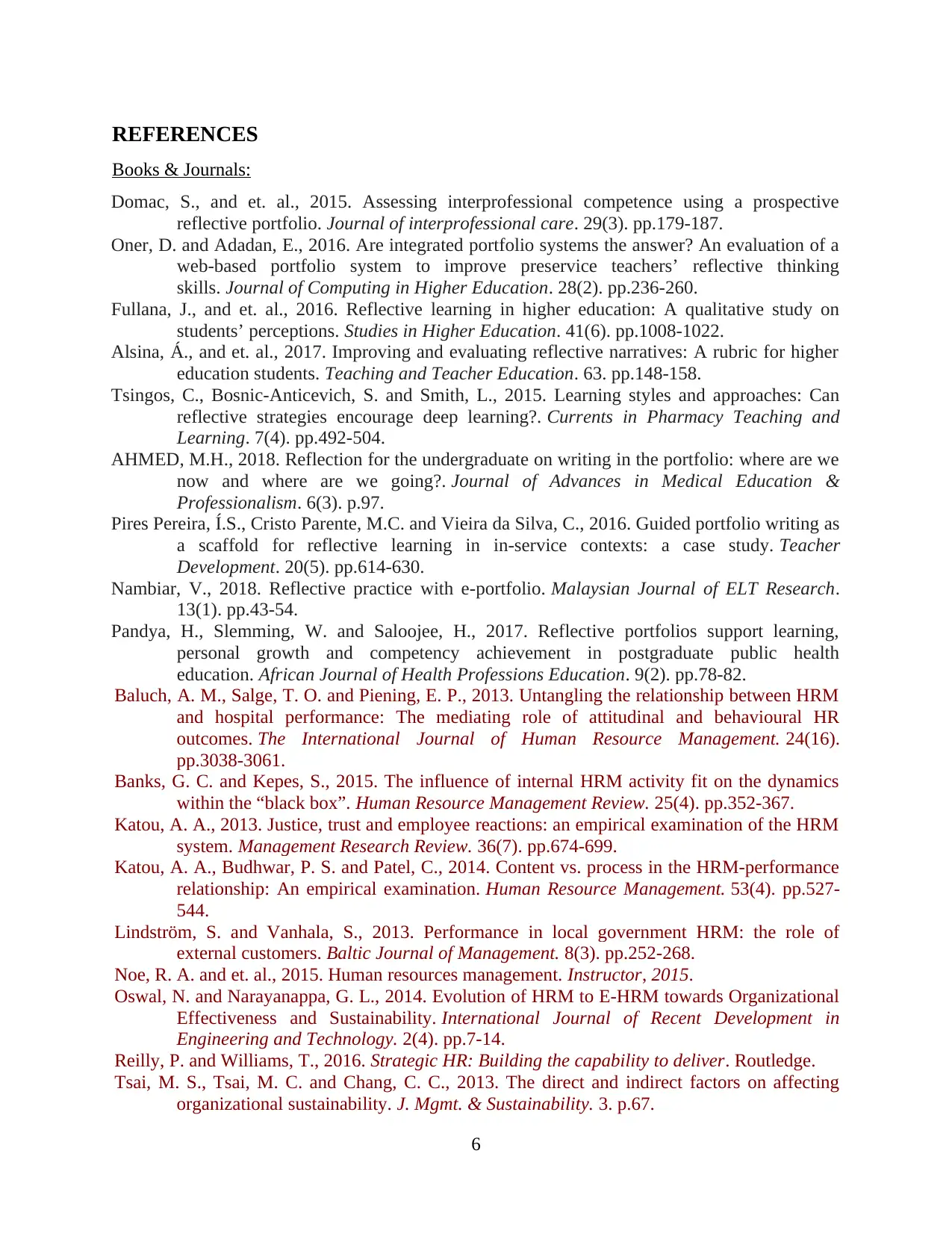
REFERENCES
Books & Journals:
Domac, S., and et. al., 2015. Assessing interprofessional competence using a prospective
reflective portfolio. Journal of interprofessional care. 29(3). pp.179-187.
Oner, D. and Adadan, E., 2016. Are integrated portfolio systems the answer? An evaluation of a
web-based portfolio system to improve preservice teachers’ reflective thinking
skills. Journal of Computing in Higher Education. 28(2). pp.236-260.
Fullana, J., and et. al., 2016. Reflective learning in higher education: A qualitative study on
students’ perceptions. Studies in Higher Education. 41(6). pp.1008-1022.
Alsina, Á., and et. al., 2017. Improving and evaluating reflective narratives: A rubric for higher
education students. Teaching and Teacher Education. 63. pp.148-158.
Tsingos, C., Bosnic-Anticevich, S. and Smith, L., 2015. Learning styles and approaches: Can
reflective strategies encourage deep learning?. Currents in Pharmacy Teaching and
Learning. 7(4). pp.492-504.
AHMED, M.H., 2018. Reflection for the undergraduate on writing in the portfolio: where are we
now and where are we going?. Journal of Advances in Medical Education &
Professionalism. 6(3). p.97.
Pires Pereira, Í.S., Cristo Parente, M.C. and Vieira da Silva, C., 2016. Guided portfolio writing as
a scaffold for reflective learning in in-service contexts: a case study. Teacher
Development. 20(5). pp.614-630.
Nambiar, V., 2018. Reflective practice with e-portfolio. Malaysian Journal of ELT Research.
13(1). pp.43-54.
Pandya, H., Slemming, W. and Saloojee, H., 2017. Reflective portfolios support learning,
personal growth and competency achievement in postgraduate public health
education. African Journal of Health Professions Education. 9(2). pp.78-82.
Baluch, A. M., Salge, T. O. and Piening, E. P., 2013. Untangling the relationship between HRM
and hospital performance: The mediating role of attitudinal and behavioural HR
outcomes. The International Journal of Human Resource Management. 24(16).
pp.3038-3061.
Banks, G. C. and Kepes, S., 2015. The influence of internal HRM activity fit on the dynamics
within the “black box”. Human Resource Management Review. 25(4). pp.352-367.
Katou, A. A., 2013. Justice, trust and employee reactions: an empirical examination of the HRM
system. Management Research Review. 36(7). pp.674-699.
Katou, A. A., Budhwar, P. S. and Patel, C., 2014. Content vs. process in the HRM‐performance
relationship: An empirical examination. Human Resource Management. 53(4). pp.527-
544.
Lindström, S. and Vanhala, S., 2013. Performance in local government HRM: the role of
external customers. Baltic Journal of Management. 8(3). pp.252-268.
Noe, R. A. and et. al., 2015. Human resources management. Instructor, 2015.
Oswal, N. and Narayanappa, G. L., 2014. Evolution of HRM to E-HRM towards Organizational
Effectiveness and Sustainability. International Journal of Recent Development in
Engineering and Technology. 2(4). pp.7-14.
Reilly, P. and Williams, T., 2016. Strategic HR: Building the capability to deliver. Routledge.
Tsai, M. S., Tsai, M. C. and Chang, C. C., 2013. The direct and indirect factors on affecting
organizational sustainability. J. Mgmt. & Sustainability. 3. p.67.
6
Books & Journals:
Domac, S., and et. al., 2015. Assessing interprofessional competence using a prospective
reflective portfolio. Journal of interprofessional care. 29(3). pp.179-187.
Oner, D. and Adadan, E., 2016. Are integrated portfolio systems the answer? An evaluation of a
web-based portfolio system to improve preservice teachers’ reflective thinking
skills. Journal of Computing in Higher Education. 28(2). pp.236-260.
Fullana, J., and et. al., 2016. Reflective learning in higher education: A qualitative study on
students’ perceptions. Studies in Higher Education. 41(6). pp.1008-1022.
Alsina, Á., and et. al., 2017. Improving and evaluating reflective narratives: A rubric for higher
education students. Teaching and Teacher Education. 63. pp.148-158.
Tsingos, C., Bosnic-Anticevich, S. and Smith, L., 2015. Learning styles and approaches: Can
reflective strategies encourage deep learning?. Currents in Pharmacy Teaching and
Learning. 7(4). pp.492-504.
AHMED, M.H., 2018. Reflection for the undergraduate on writing in the portfolio: where are we
now and where are we going?. Journal of Advances in Medical Education &
Professionalism. 6(3). p.97.
Pires Pereira, Í.S., Cristo Parente, M.C. and Vieira da Silva, C., 2016. Guided portfolio writing as
a scaffold for reflective learning in in-service contexts: a case study. Teacher
Development. 20(5). pp.614-630.
Nambiar, V., 2018. Reflective practice with e-portfolio. Malaysian Journal of ELT Research.
13(1). pp.43-54.
Pandya, H., Slemming, W. and Saloojee, H., 2017. Reflective portfolios support learning,
personal growth and competency achievement in postgraduate public health
education. African Journal of Health Professions Education. 9(2). pp.78-82.
Baluch, A. M., Salge, T. O. and Piening, E. P., 2013. Untangling the relationship between HRM
and hospital performance: The mediating role of attitudinal and behavioural HR
outcomes. The International Journal of Human Resource Management. 24(16).
pp.3038-3061.
Banks, G. C. and Kepes, S., 2015. The influence of internal HRM activity fit on the dynamics
within the “black box”. Human Resource Management Review. 25(4). pp.352-367.
Katou, A. A., 2013. Justice, trust and employee reactions: an empirical examination of the HRM
system. Management Research Review. 36(7). pp.674-699.
Katou, A. A., Budhwar, P. S. and Patel, C., 2014. Content vs. process in the HRM‐performance
relationship: An empirical examination. Human Resource Management. 53(4). pp.527-
544.
Lindström, S. and Vanhala, S., 2013. Performance in local government HRM: the role of
external customers. Baltic Journal of Management. 8(3). pp.252-268.
Noe, R. A. and et. al., 2015. Human resources management. Instructor, 2015.
Oswal, N. and Narayanappa, G. L., 2014. Evolution of HRM to E-HRM towards Organizational
Effectiveness and Sustainability. International Journal of Recent Development in
Engineering and Technology. 2(4). pp.7-14.
Reilly, P. and Williams, T., 2016. Strategic HR: Building the capability to deliver. Routledge.
Tsai, M. S., Tsai, M. C. and Chang, C. C., 2013. The direct and indirect factors on affecting
organizational sustainability. J. Mgmt. & Sustainability. 3. p.67.
6
⊘ This is a preview!⊘
Do you want full access?
Subscribe today to unlock all pages.

Trusted by 1+ million students worldwide

7
1 out of 10
Related Documents
Your All-in-One AI-Powered Toolkit for Academic Success.
+13062052269
info@desklib.com
Available 24*7 on WhatsApp / Email
![[object Object]](/_next/static/media/star-bottom.7253800d.svg)
Unlock your academic potential
Copyright © 2020–2026 A2Z Services. All Rights Reserved. Developed and managed by ZUCOL.



